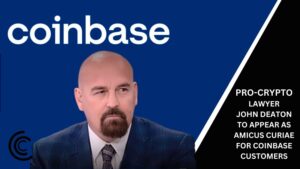Key Takeaways
- Roger Ver has rubbished the allegations and stated that CoinFLEX owes him money.
- Recently, CoinFLEX launched Recovery Value USD (rvUSD) token to raise funds to cover outstanding debts unpaid by a high-profile customer.
- According to CoinFLEX CEO Lamb, the exchange has a written contract with Roger obligating him to personally guarantee any negative equity on his CoinFLEX account and further top up margin regularly.
CoinFLEX CEO Mark Lamb took to Twitter to claim that the crypto investor Roger Ver owes the exchange $47 million in USDC. Roger Ver touted as ‘Bitcoin Jesus’ has, however, rubbished the allegations.
The string of events leading to a very public spat between two big names in the industry started when rumors surfaced regarding Roger’s alleged unpaid debt of $47 million in crypto. ‘Bitcoin Jesus’ responded to the rumors on Tuesday morning with a tweet that denied the allegations further claiming that CoinFLEX owes him money.
“Recently, some rumors have been spreading that I have defaulted on a debt to a counter-party,” Ver tweeted. “These rumors are false. Not only do I not have a debt to this counter-party, but this counter-party owes me a substantial sum of money, and I am currently seeking the return of my funds”, his tweet reads.
CoinFLEX CEO Mark Lamb in response to the tweet, made a thread stating that Roger Ver owes the platform $47 million USDC, and the exchange had issued Ver a notice of default. According to Lamb, CoinFLEX has a written contract with Roger obligating him to personally guarantee any negative equity on his CoinFLEX account and further top up margin regularly.
“He has been in default of this agreement and we have served a notice of default”, Lamb’s Tweet reads. CoinFLEX CEO further added that Ver has a long track record of previously topping up margin and meeting margin requirements under their agreement and would like to resolve the current problem.
Amid a volatile crypto market, CoinFLEX recently froze withdrawals. On Monday, the firm launched a new crypto token- Recovery Value USD (rvUSD) to raise funds to cover outstanding unpaid debts by a high-profile customer.
At the time, the exchange stated that a long-time customer’s account went into negative equity, meaning the Individual’s account currently holds a negative balance. The exchange further added that a clause in the contract however prevented the firm from liquidating them instead of allowing them to pledge stringent personal guarantees. According to the platform, the person was a high-integrity person of significant means who was experiencing temporary liquidity issues due to the bear market.











